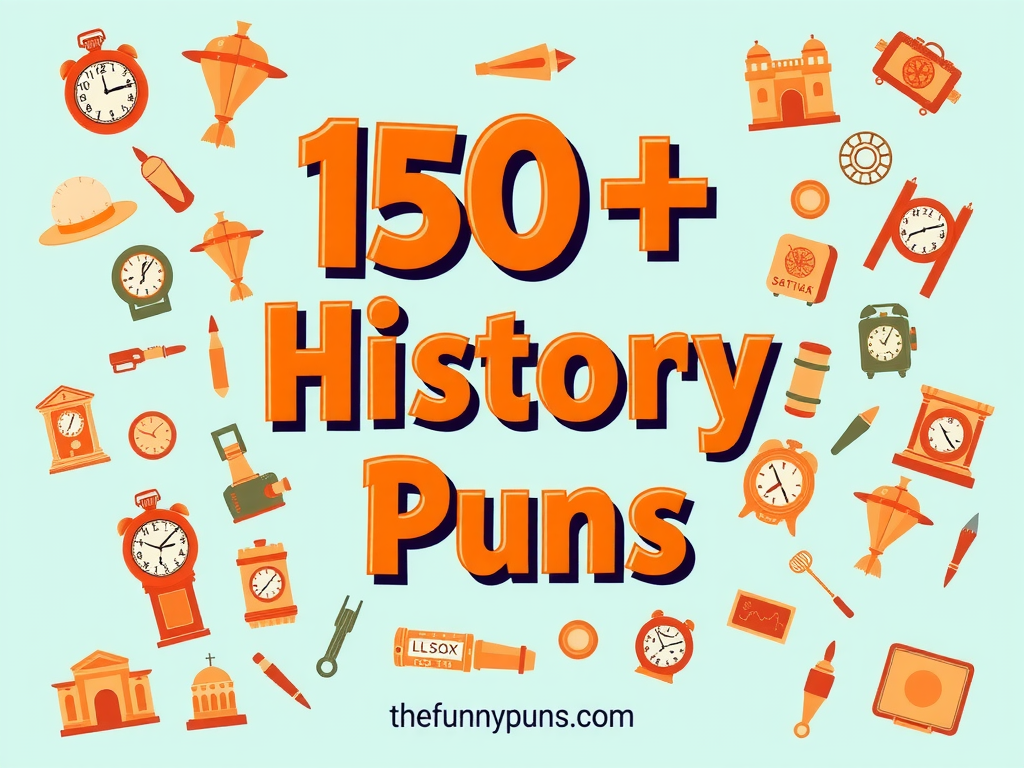History can be fascinating, but it can also be funny. Short history puns bring a bit of humor to the past, making learning more enjoyable.
Imagine laughing while you learn about ancient civilizations or historical figures. Short history puns can make that happen. They add a playful twist to otherwise serious events. By combining wit and history, these puns offer a unique way to remember facts.
Whether you’re a history buff or just looking for a quick laugh, these puns are perfect. They make history more accessible and fun. Keep reading to discover some clever and amusing history puns that will surely tickle your brain and your funny bone.

Credit: www.amazon.com
Introduction To Historical Humor
Explore the world of short history puns. They blend humor with historical events, making learning fun and engaging. Perfect for history enthusiasts and those who love a good laugh.
Why History Puns?
History puns make learning fun. They mix facts with humor. Many people enjoy them. Kids and adults love a good joke. Especially when it’s about the past. These puns can be simple or clever. Everyone can understand a pun.
The Appeal Of Time-traveling Jokes
Time-traveling jokes are funny. They play with history. Imagine meeting famous people. Or seeing ancient events. This makes jokes exciting. They connect the past to the present. It feels like a fun adventure.
Ancient Civilizations
Greek myths were full of humor. The gods loved to play tricks. One day, Zeus told a joke. It was so funny, even the statues laughed. Athena said, “That joke was Olympian!”
Romans had a joke about a centurion. “Why did the centurion bring a ladder to the bar?” The answer: “To reach the high spirits!” They loved puns about their daily life. Roman humor was clever and simple.
Medieval Merriment
Brave knights often told jokes to stay cheerful. A knight might say, “Why did the knight carry a ladder? To reach the high points in battle!” These jokes kept spirits high. Even in tough times, knights enjoyed a good laugh. They had a great sense of humor.
Court jesters were the comedians of the castle. Their job was to make everyone laugh. One jester might joke, “Why don’t castles ever get lost? Because they have strong walls to guide them home!” These jokes were simple but funny. Jesters used clever wordplay. Their humor was always in high demand.
Renaissance Riddles
Leonardo da Vinci was not just a painter. He was a true Renaissance man. His Mona Lisa always had a mysterious smile. Do you know why? Because she was in on the joke. Michelangelo created David with such care. Yet, he never cracked a smile. Maybe he was just stoned-faced. Renaissance artists were truly masters of their craft. They also knew how to have fun.
Galileo looked through his telescope and saw the stars. He must have said, “That’s stellar!” Newton watched an apple fall and discovered gravity. He probably thought, “What a fruitful idea!” Copernicus told everyone the Earth wasn’t the center. He said, “Don’t let it go to your head!” Renaissance scientists made great discoveries. They also had a sense of humor.
Colonial Chuckles
Pilgrims never had a fowl time with turkeys. They had a feast for laughs. They knew how to make a Mayflower bouquet. Their jokes were harvested every autumn. They always kept their ship-shape humor.
Founding Fathers often had a revolutionary sense of humor. Benjamin Franklin was a punny guy. He always had a spark in his jokes. George Washington never told a lie, even in jest. They made sure their humor was independent of seriousness.
Victorian Humor
Victorian humor had a unique charm. Puns were very popular. People loved wordplay. They enjoyed clever jokes. These puns made them laugh. Even Queen Victoria appreciated a good pun. Witty remarks were common. They added joy to conversations. Simple jokes often had deep meanings. Victorians loved to be clever and subtle.
The Industrial Revolution brought many changes. It also brought ironic jokes. Machines replaced many jobs. People joked about it. They found humor in new inventions. Irony was everywhere. Factories were noisy. Yet, people made jokes about it. They laughed at the odd situations. Humor helped them cope. It made life bearable.
20th Century Wit
Soldiers often used humor to stay strong. Jokes about the enemy were common. They kept spirits high. Churchill was famous for his witty remarks. He once said, “If you’re going through hell, keep going.” This gave people hope. Even in dark times, laughter was vital.
Different countries had their own jokes. In the U.S., puns about presidents were popular. People joked, “Why did the scarecrow become a diplomat? He was outstanding in his field.” In Germany, people made fun of strict rules. They joked, “Why did the German cross the road? To follow orders.” These puns made tough times lighter.
Modern Day Mirth
History puns have found a new home online. Social media is full of them. Memes make history fun. People share jokes about famous events. They laugh at funny twists. These puns spread fast. Everyone enjoys a good joke.
History puns are not just local. They travel the world. Translators help spread these jokes. Different cultures add their own twist. It is amazing to see. The humor is universal. Everyone loves to laugh at the past.
Creating Your Own History Puns
Think of famous events and people. Mix them with funny words. Keep it short and sweet. Play with sounds and meanings. Try to make a pun that makes others laugh.
Use simple words. Make sure your joke is easy to understand. Check if it makes sense. Share with friends. See if they get it. If they laugh, you did well.
Here are some fun examples:
- “Why was the math book sad? It had too many problems.”
- “Why did the scarecrow become a successful history teacher? He was outstanding in his field.”
- “Why did the knight never become a history major? He couldn’t handle the past.”

Credit: punfinity.com

Credit: www.pinterest.com
Frequently Asked Questions
What Are History Puns?
History puns are jokes that play on words related to historical events or figures.
Why Are History Puns Popular?
They make learning history fun. They use humor to engage and educate.
Can History Puns Be Educational?
Yes, they can. They help people remember historical facts in a fun way.
What Is An Example Of A History Pun?
“Why did the scarecrow become a politician? He was outstanding in his field. “
How Do History Puns Help In Learning?
They create associations between humor and facts. This makes information easier to remember.
Are History Puns Suitable For Kids?
Yes, they are. They simplify complex historical events into fun, memorable jokes.
Where Can I Find History Puns?
You can find them in books, online articles, and educational websites.
Can History Puns Improve Memory?
Yes, they can. They make it easier to recall historical facts through humor.
Do History Puns Cover All Historical Periods?
Yes, they do. They can cover ancient, medieval, and modern history.
Are History Puns Used In Classrooms?
Yes, many teachers use them. They make lessons more engaging and fun.
Conclusion
History puns offer a fun way to learn about the past. They make complex events memorable and enjoyable. Sharing these puns can spark interest in history. They can also make you smile. Try telling a history pun to a friend.
Watch their reaction. It’s a great way to lighten the mood. Enjoying history through humor makes learning effortless and fun. Keep exploring more puns. You might discover new favorite ones. Keep the laughter alive while you learn.


Comments